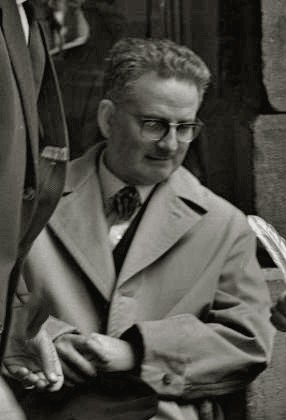Julio Caro Baroja facts for kids
Quick facts for kids
Julio Caro Baroja
|
|
|---|---|

Caro Baroja in 1965
|
|
| Born | 13 November 1914 Madrid, Spain
|
| Died | 18 August 1995 (aged 80) Bera (Navarre), Spain
|
| Nationality | Spanish |
| Occupation | Anthropologist, historian and author |
| Seat P of the Real Academia Española | |
| In office 15 June 1986 – 18 August 1995 |
|
| Preceded by | Guillermo Díaz-Plaja |
| Succeeded by | Ángel González Muñiz |
Julio Caro Baroja (born November 13, 1914 – died August 18, 1995) was a Spanish expert in many fields. He was an anthropologist (someone who studies human societies and cultures), a historian (someone who studies the past), a linguist (someone who studies languages), and an essayist (someone who writes essays). He was especially interested in the culture, history, and society of the Basque people, who live in parts of Spain and France.
Julio Caro Baroja came from a famous family. He was the nephew of the well-known writer Pio Baroja and his brother, Ricardo Baroja, who was a painter and writer. Julio is buried in his family's special plot in the cemetery of Bera, Navarre, close to their home called Itzea.
Biography
Julio was the oldest son of Rafael Caro Raggio. His father started a publishing company in Madrid in 1917. His mother, Carmen Baroja, was a Spanish writer and ethnologist (someone who studies different cultures). She wrote under the name Vera Alzate.
When he was a child, Julio moved to the town of Bera in Navarre. He spent a lot of time there with his uncle, Pio Baroja. His uncle was very interested in Julio's education and had a big impact on him.
Julio went to the Instituto-Escuela de Madrid from 1921 to 1931. Later, he was studying at the University of Madrid when the Spanish Civil War began. He quickly returned to Bera. His father stayed in Madrid and lost his printing business when his office was destroyed during a bombing.
After the war, Julio went back to Madrid to finish his studies. He earned a PhD in Ancient History with top honors. He worked as an assistant in history and language departments. Then, he became the Director of the Museo del Pueblo Español (Museum of the Spanish People) from 1942 to 1953.
In 1947, Julio was chosen as a member of the Royal Academy of the Basque Language. He also joined the Real Academia de las Buenas Letras in Barcelona. In 1951, he received money from the Wenner-Gren Foundation. This allowed him to do research on different cultures in the United States.
From 1952 to 1957, he led a Spanish research trip to the Spanish Sahara. He later said that he felt like a different person when he wrote a book about the nomads there.
Julio grew up in a quiet community where some people still believed in magic and witchcraft. This made him interested in these topics. Before he was 20, he talked to older people who truly believed that some men and women could turn into animals or fly. He read many books about it.
His interest in magic grew again during a trip to London. He bought more books and combined his old and new findings. He then offered a new way of looking at how people understood the magical world around them. In his book, The World of the Witches (1961), he explained that beliefs about witches change over time, just like any other social group. He showed how this topic connected social history with anthropology.
In 1952, the British Council asked him to guide students who wanted to study Anthropology at the University of Oxford. He also taught ethnology (the study of different cultures) at the University of Coimbra in Portugal. In 1961, he became a Director of Studies in Social and Economic History in Paris.
Julio Caro Baroja received important awards for his work. In 1983, he won the Prince of Asturias Awards. In 1989, he was given the Menéndez Pelayo International Prize for his research in Spanish ethnology.
Legacy
Julio Caro Baroja is remembered throughout Spain. There is a square named Plaza Julio Caro Baroja in San Sebastian. Also, several schools are named after him, such as I.E.S. Julio Caro Baroja in Fuenlabrada (near Madrid), Getxo (near Bilbao), Málaga (Andalusia), and Pamplona (Navarre). These names honor his many achievements and his important contributions to anthropology and history.
See also
 In Spanish: Julio Caro Baroja para niños
In Spanish: Julio Caro Baroja para niños
 | Bayard Rustin |
 | Jeannette Carter |
 | Jeremiah A. Brown |

